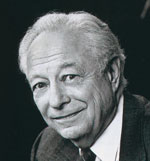I stumbled upon the following passage by Irving Kristol, so-called father of the neoconservative movement, in his 1978 speech “The Spiritual Roots of Capitalism.” I’m posting it here in the hope of generating some discussion.
in the hope of generating some discussion.
Christianity and Judaism in the United States today face many of the same problems, though they do not share all the same problems. When I talk about religion, I talk as an insider, but when I talk about Christianity, I think it will be very clear that I talk as an outsider. When I say I am not a Christian, I do not say it polemically, of course. But whether one is Jewish or Christian does, it seems to me, affect one’s attitude toward capitalism.
Orthodox Jews never have despised business; Christians have. The act of commerce, the existence of a commercial society, has always been a problem for Christians. Commerce has never been much of a problem for Jews. I have never met an Orthodox Jew who despised business–though I have met some Reformed Jews who are businessmen and despise business.
Getting rich has never been regarded as being in any way sinful, degrading, or morally dubious within the Jewish religion, so long as such wealth is acquired legally and used responsibly. I was raised in a fairly Orthodox Jewish home, and everyone I knew was in business, including most of the rabbis. No one could make a living in those days as a rabbi, so rabbis ran shops, or their wives ran shops for them. It was generally assumed that the spirit of commerce is perfectly compatible with full religious faith and full religious practice. I think that is true in Islam as well, but it is not true in Christianity. The difference is that both Islam and Judaism are religions of the Law, and Christianity is a religion that has repealed the Law. This difference gives Christianity immense advantages over both Judaism and Islam in terms of spiritual energy; but in its application to the practical world, it creates enormous problems.















